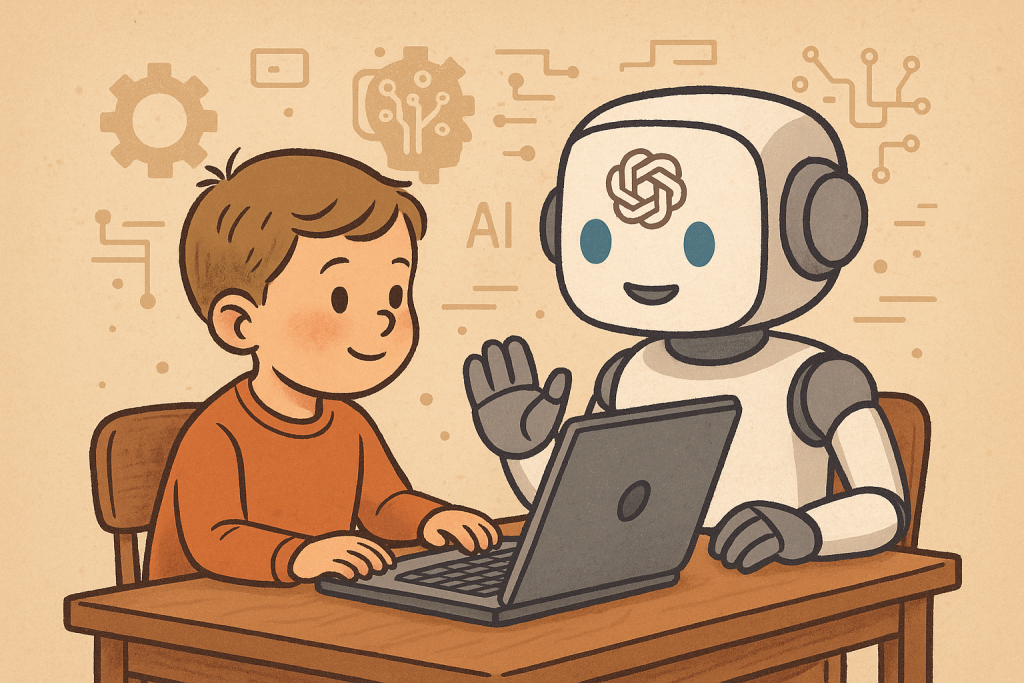How Growing Up with ChatGPT Will Shape the Next Generation
Children of the AI Era: A New Human Experience
Children born in the 2020s are entering a world where artificial intelligence is not a novelty—but a daily norm. From smart toys and voice assistants to personalized learning platforms and AI-generated cartoons, today’s children are immersed in technology that responds, adapts, and learns from them.
More specifically, conversational agents like ChatGPT are not just helping with homework—they’re shaping how children think, learn, and interact with the world. Unlike past generations raised on books and broadcast media, this new generation is growing up with interactive intelligence—and that changes everything.
The Impact of AI on Early Education
Personalized Learning from Day One
AI tools such as Khanmigo (powered by GPT-4) or Socratic by Google are already creating customized learning pathways for students. For children aged 3–8, this means:
- On-demand answers to questions
- Adaptive reading materials based on comprehension level
- AI tutors providing non-judgmental support
- Real-time spoken feedback and encouragement
This level of personalization may accelerate learning for some—but it could also reduce resilience, patience, and collaborative problem-solving if not balanced with traditional educational models.
Reduced Teacher Dependency or Enhanced Support?
Some argue that AI tools may reduce the need for human teachers in early education. Others see them as augmentation tools that help teachers focus on emotional and social development while AI handles repetition and testing.
But what happens when a 6-year-old trusts ChatGPT more than their teacher? That question opens the door to a fundamental shift in authority and trust during cognitive development.
Emotional and Cognitive Development in the Age of AI
The Effects of Constant Feedback
Children growing up with AI assistants often receive instant gratification in the form of answers, encouragement, or praise. While this boosts confidence, it can also result in:
- Low frustration tolerance when answers aren’t immediate
- Impatience with slow-paced human interaction
- Overreliance on automation rather than creative reasoning
Psychologists warn of a future where AI becomes a child’s primary sounding board—affecting how they interpret right vs. wrong, failure, and ambiguity.
Emotional Bonding with Machines
AI like ChatGPT can now speak with empathy, tell jokes, and even remember prior context. While this makes AI feel more human, it risks confusing emotional boundaries in young minds. Some children may form parasocial relationships with AI similar to those they form with fictional characters or influencers.
According to MIT Media Lab research, AI’s increasing emotional intelligence means children might one day turn to chatbots for comfort, confession, or companionship—a behavior that needs careful ethical consideration.
Socialization in an AI-Dominated World
Interpersonal Skills at Risk
As children rely more on AI to answer questions or resolve conflict, there’s a chance they may struggle to develop interpersonal negotiation, empathy, or teamwork. These are learned primarily through peer interaction—not artificial agents.
If ChatGPT becomes the preferred “friend,” children may find it harder to adapt in real-world group settings where:
- Emotional nuance is not pre-programmed
- Misunderstandings are not instantly corrected
- Patience and compromise are essential
Digital Identity and Voice Simulation
As tools like HeyGen and Synthesia allow children to create avatars that speak in their voice or likeness, the lines between their online self and real self may blur. This can lead to:
- Early identity confusion
- Pressure to “perform” online
- Difficulty separating reality from simulation
The Future of Creativity in AI-Native Children
Will AI Kill Creativity or Supercharge It?
This is one of the most contested questions in developmental psychology today.
AI can:
- Co-write bedtime stories
- Help illustrate art projects
- Generate custom music or video
For children raised in this environment, creativity becomes collaborative, not solitary. Instead of asking “What can I imagine?” children may ask, “What can I prompt AI to imagine for me?”
This shift risks turning creativity into curation, which may stifle original thinking if not counterbalanced with offline creative play.
But if guided correctly, AI can become a springboard for:
- Storytelling with new tools
- Coding basic AI apps
- Designing games or animations
According to the World Economic Forum, AI-enhanced creativity could be one of the most valuable assets in tomorrow’s job market—if kids are taught how to create with it, not just consume it.
The Evolving Role of Parents and Educators
Digital Parenting in the ChatGPT Era
Parents must now address questions like:
- “Should my child talk to ChatGPT?”
- “Is it okay for AI to help with their homework?”
- “How do I balance AI exposure with human connection?”
Instead of banning AI, experts recommend co-engagement: sitting with your child while they use tools like ChatGPT Kids or Read Along by Google. This builds trust and encourages critical thinking around tech use.
Teaching AI Literacy Early
Schools should teach children to:
- Recognize AI-generated content
- Understand how algorithms work
- Distinguish between human and machine thinking
- Ask ethical questions about AI usage
Organizations like MediaSmarts and Common Sense Education are already leading initiatives to prepare students for AI-integrated futures.
Ethical Questions: Who is Raising Our Children?
AI will soon power:
- Smart cribs
- Emotion-sensing toys
- Adaptive learning environments
- Personalized mental health apps for kids
As this expands, we must ask: Who programs the values into the tools our children rely on?
If a child’s worldview is shaped by an AI trained on biased, Western-centric data, the result could be unintended digital conditioning.
This brings up urgent questions:
- Should AI for children be open-source and transparent?
- How do we ensure diverse training data?
- What are the boundaries between assistance and manipulation?
Conclusion: Growing Up in the Age of AI
Children born into the world of ChatGPT will be faster learners, tech-fluent communicators, and adaptive problem solvers. But without human-centered guidance, they may also struggle with critical thinking, emotional resilience, and identity formation.
We must rethink childhood for the AI era—not by rejecting AI, but by redefining the role humans play within it.
Let’s raise a generation that doesn’t just consume AI—but understands it, shapes it, and questions it wisely.
FAQs
Should young children use AI like ChatGPT?
Yes, but only under adult supervision, with age-appropriate prompts and boundaries.
Can AI replace teachers for kids?
AI can support learning, but cannot replace human connection, nuance, or emotional development.
What’s the biggest risk of growing up with AI?
Overreliance on instant answers, reduced creativity, and emotional attachment to non-human agents.
How can we prepare kids for AI in school and life?
Teach AI literacy, critical thinking, and ensure they have strong offline social experiences.


